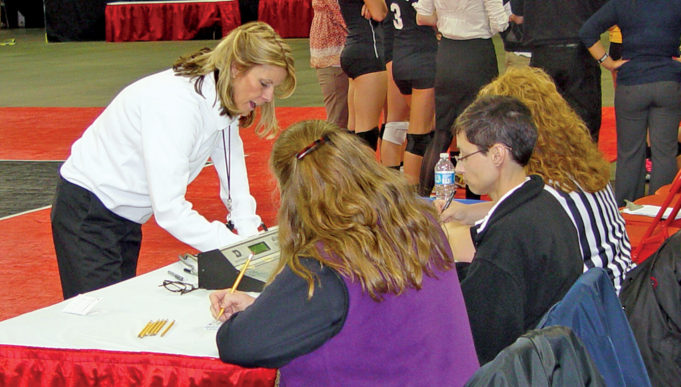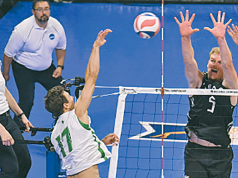For years, we’ve never really acknowledged the importance of the scorer as an integral part of a volleyball officiating crew. It seems there has always been a pecking order — first referee, second referee, line judges … and then the scorer. But anyone who has had a major scoring snafu during a match, or for that matter anyone who has benefitted from a scorer who is on top of things, can attest to the fact that he or she plays a vital role in a well-managed match.
USA Volleyball has a scorer certification program, including a national scorer rating. PAVO provides an initial certification program for collegiate scorers through local PAVO boards, which includes in-depth training materials using the NCAA scoresheet. And NFHS also recognizes the importance of the scorer, and this year added the libero tracker as a required member of the officiating crew.
So with our three governing bodies acknowledging the importance of the scorer in their rules and officiating structures, it’s time that referees do the same. It starts with learning how to interact with a scorer to ensure a smooth-flowing contest.
We all have to start somewhere.
Inevitably, you will have an assignment where your scorer is inexperienced — maybe a parent from the stands or a kid from study hall. They deserve good pre-match instructions. If they have little or no experience, then stick to the basics, like recording points, substitutions and timeouts. It will be important that you give them all the time they need to record substitutions accurately during the match. When it comes to less common situations like recording a sanction, help them get it right by telling them exactly what information to record. The scoresheet is the official record of the match, and you want to make sure it is as accurate as possible.
Some experience under their belt.
If the scorer has some experience, your pre-match instructions are still important, but it is equally important for you to assess their level of experience so that you can communicate clearly, giving them the information they need. Ask how they will handle certain match situations — recording a sanction or substitution, a libero serving or notifying you of a wrong server, for example. You can also ask that they help you by quickly providing basic team information such as substitutions or timeouts used upon request.
The most experienced table crew.
When you have the opportunity to work with an experienced crew at the scorer’s table, the match can flow smoothly with minimal interruptions. It is best if you ask an experienced crew how they communicate with each other during the match. Often the libero tracker will provide player numbers during substitutions, verbally identify when the libero serves, and assist with other match details. It is best that you allow them to work within their system and that you adapt to their methods.
The libero tracker. Although the scorer handles much of the scoring responsibility, the libero tracker is still an integral part of the team. Again, his or her experience level will dictate how you communicate with each other and what information he or she will provide to you. It’s important that libero trackers understand their role, especially if they don’t have much experience. Show them how libero replacements and substitutions are recorded on the tracking sheet and explain when a replacement is illegal and how they should notify you. Remind them that you’ll be asking about the status of each team’s libero (on/off the court) during timeouts.
When it all comes together.
Our goal in each match, regardless of the experience level of the table crew, is to communicate clearly and respectfully, not only with each other but also with the teams. It starts with your approach and demeanor during pre-match instructions. Ask questions. Be flexible. Work within their system instead of trying to make them do it your way.
Hints and tips.
Start the match on the right foot by working together. As the scorer records team lineups on the scoresheet, ensure that the service order has been recorded correctly. The libero tracker should record lineups directly from the lineup sheet instead of the scoresheet; otherwise, if the scorer made an error recording the lineup, the libero tracker will repeat the same mistake. Then as you check lineups to start each set, ask that the scorer and libero tracker verify the players on the court. That ensures a wrong player doesn’t start the set.
With an experienced scorer who works well with the libero tracker, you’ll often find that they’re communicating substitution numbers quite well. Don’t interfere. Listen to their communication, and if you’ve seen the same players exchanging that they’ve identified, you don’t need to repeat numbers.
Come up with a few catch phrases that you can use with the scorer, and discuss the use of those phrases during your pre-match discussions. For example, “give me Team X” might mean “give me the next three servers for Team X.” That will be your front row and can help with identifying alignment issues. You might also ask for the last server for one of the teams, which will again help you with alignments.
Let the scorer know when you’d like them to start notifying you about team substitution counts. That allows you to have that information immediately ready late in a set when a coach might ask how many substitutions have been used. Even though a team can have 18 subs in NFHS (12 in USAV; 15 in NCAA), it’s a good idea to have the scorer start reminding you four or five subs in advance of that total even if you’re using a lineup card (NFHS).
Scorers — the entire crew at the table, in fact — are vital to successfully officiating a match. Work on your communication skills with those team members. Be respectful, flexible and patient. Allow an experienced crew to work within its system, or be prepared to help a new scorer learn the basics. Your investment in those individuals will make you a better referee.
What's Your Call? Leave a Comment:
Note: This article is archival in nature. Rules, interpretations, mechanics, philosophies and other information may or may not be correct for the current year.
This article is the copyright of ©Referee Enterprises, Inc., and may not be republished in whole or in part online, in print or in any capacity without expressed written permission from Referee. The article is made available for educational use by individuals.


















